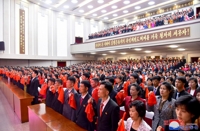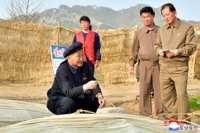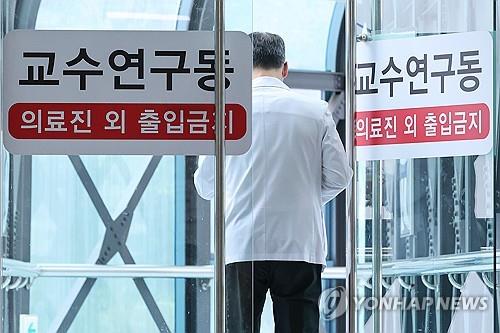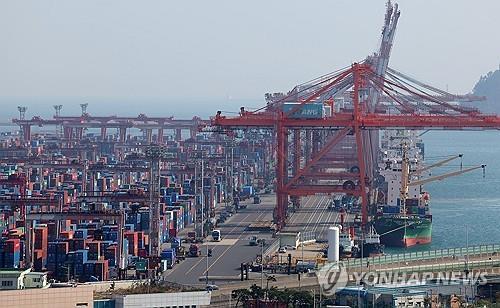(News Focus) Koreas declare end to military confrontation, present peace vision
By Lee Chi-dong
SEOUL, April 27 (Yonhap) -- The leaders of the two Koreas took a meaningful, perhaps sensational, step Friday towards a lasting peace on the peninsula during their Panmunjom summit that was meant to write a "new history."
President Moon Jae-in and North Korean leader Kim Jong-un set the end of this year as the deadline for replacing the 1953 Armistice Agreement with a peace treaty, a prerequisite for peace on the Korean Peninsula, effectively passing the ball to other regional powers.
They agreed to push for trilateral talks involving the U.S. or four-way negotiations also including China, according to the so-called Panmunjom declaration.
It demonstrated again that South Korea is a key party involved in the peace process, although it's not a signatory to the armistice agreement inked at the summit venue 65 years ago.
The declaration was a de-facto guideline for face-to-face discussions between Kim and U.S. President Donald Trump probably in May or early June.
At issue is whether Kim and Trump will make progress in their showdown on the nuclear issue.
North Korea has demanded a dual-track approach of pursuing the denuclearization of Korea and the establishment of a peace mechanism here, a strategy supported by China.
Realistically, however, it's out of the question for the U.S. to accept a peace regime without significant progress on denuclearization, which is the name of the game.
On building mutual trust, meanwhile, Moon and Kim decided to terminate all military hostilities between the two sides.
They promised to turn the heavily-fortified the Demilitarized Zone (DMZ) into a "genuine peace zone" and create a "peace sea" around the tense Yellow Sea border.
The historic talks between Moon Jae-in and Kim Jong-un apparently produced few new mind-blowing agreements on reducing military tensions in Korea.
Much of what was agreed was reminiscent of the second inter-Korean summit, held in Pyongyang in 2007.
A higher possibility of being implemented is what differentiates this agreement from the previous one, however.
Both Moon and Kim emphasized their resolve to translate the statement into action.
"From now on, we will never go back ... as we took this audacious step to achieve South-North peace, co-prosperity and reunification, which is the desire of the Korean people, on our own," Moon said, standing next to Kim.
Kim stressed the need to stop the "unfortunate history" of the two Koreas striking accords and failing to implement them, which he would do by continuing close consultations with Moon.
In fact, they indicated a brisk round of talks through various channels in the coming months to follow up on the summit deal.
The leaders plan to have "regular talks" and to often converse with each other by phone.
The two sides also agreed to "frequently" hold military talks, including between their defense ministers. First will come general-level military talks next month.
Concrete measures on reducing border tensions will likely be discussed on top of the summit agreements that include the suspension of cross-border propaganda broadcasts and leaflet spreading.
The two Koreas are widely expected to seek the removal of heavy weapons and guard posts (GPs) from the DMZ, as well as the expansion of military hotlines.
Another bright side is that the South's left-leaning president has four more years in office, which means he has a relatively large window for follow-up measures. Former President Roh Moo-hyun held his inter-Korean summit just months before finishing his tenure.
Most of the 2007 summit agreements became void when power shifted to the conservative Lee Myung-bak administration the following year.
lcd@yna.co.kr
(END)
-
 S. Korea marks 30th anniv. of Korean Pavilion at Venice Biennale with contemporary art
S. Korea marks 30th anniv. of Korean Pavilion at Venice Biennale with contemporary art -
 Ateez member Yunho throws first pitch at MLB match between Dodgers, Mets
Ateez member Yunho throws first pitch at MLB match between Dodgers, Mets -
 Gov't likely to accept university chiefs' request to lower med school enrollment quota
Gov't likely to accept university chiefs' request to lower med school enrollment quota -
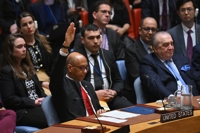 S. Korea supports resolution backing U.N. membership of Palestine
S. Korea supports resolution backing U.N. membership of Palestine -
 Chinese man behind drug scam targeting teens nabbed in Cambodia
Chinese man behind drug scam targeting teens nabbed in Cambodia
-
 S. Korea marks 30th anniv. of Korean Pavilion at Venice Biennale with contemporary art
S. Korea marks 30th anniv. of Korean Pavilion at Venice Biennale with contemporary art -
 Gov't likely to accept university chiefs' request to lower med school enrollment quota
Gov't likely to accept university chiefs' request to lower med school enrollment quota -
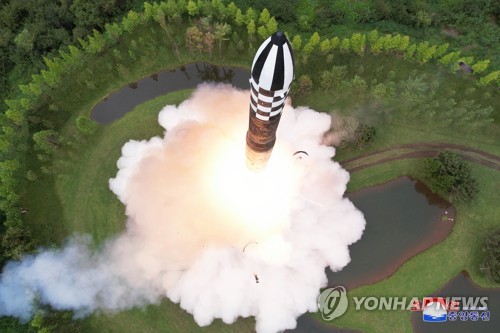 Experts see possibility of N.K. conducting nuclear test before U.S. presidential vote
Experts see possibility of N.K. conducting nuclear test before U.S. presidential vote -
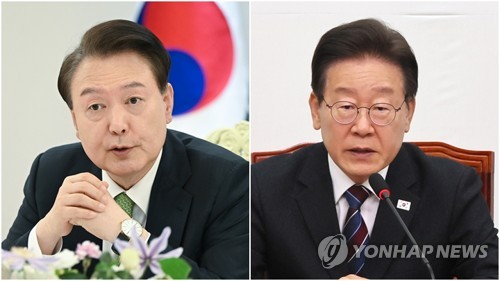 Details of meeting between Yoon, opposition leader undecided: presidential office
Details of meeting between Yoon, opposition leader undecided: presidential office -
 Looming weekly closure of major hospitals feared to worsen medical service crisis
Looming weekly closure of major hospitals feared to worsen medical service crisis
-
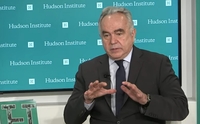 U.S. will take steps for three-way engagement on nuclear deterrence with S. Korea, Japan: Campbell
U.S. will take steps for three-way engagement on nuclear deterrence with S. Korea, Japan: Campbell -
 (LEAD) Hybe to file complaint against sublabel executives over internal conflict
(LEAD) Hybe to file complaint against sublabel executives over internal conflict -
 S. Korea reports highest suicide rate, ultra fine dust level among OECD nations: data
S. Korea reports highest suicide rate, ultra fine dust level among OECD nations: data -
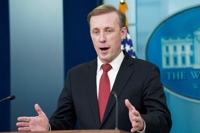 U.S. sent ATACMS missiles to Ukraine following Russia's use of N.K. missiles: White House
U.S. sent ATACMS missiles to Ukraine following Russia's use of N.K. missiles: White House -
 Looming weekly closure of major hospitals feared to worsen medical service crisis
Looming weekly closure of major hospitals feared to worsen medical service crisis
















